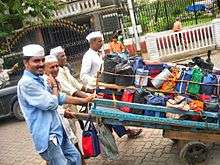Dabbawala
The dabbawalas (also spelled dabbawallas or dabbawallahs, called tiffin wallahs in older sources) constitute a lunchbox delivery and return system that delivers hot lunches from homes and restaurants to people at work in India, especially in Mumbai. The lunchboxes are picked up in the late morning, delivered predominantly using bicycles and railway trains, and returned empty in the afternoon. They are also used by meal suppliers in Mumbai, who pay them to ferry lunchboxes with ready-cooked meals from central kitchens to customers and back.[1] The 2013 Bollywood film The Lunchbox is based on the dabbawala service.
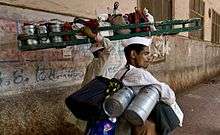 | |
| Industry | lunchbox delivery and return system |
|---|---|
| Founded | Business Start In 1890 in Mumbai |
| Headquarters | Mumbai , India |
Key people | Subhash Talekar, President |
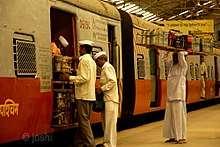
Origins
In 1890 Bombay, Mahadeo Havaji Bachche started a lunch delivery service with about a hundred men.[2] In 1930, he informally attempted to unionize the dabbawalas. Later, a charitable trust was registered in 1956 under the name of Nutan Mumbai Tiffin Box Suppliers Trust.[3] The commercial arm of this trust was registered in 1968 as Mumbai Tiffin Box Supplier's Association.[4][3][3]
The service was born in the 1890s out of sheer necessity. With more and more migrants of varying communities reaching the big cities in those days and no fast food culture and office canteens around to calm the hunger pangs at noon, there was a lack of an effective system to ensure that office-workers could eat at lunchtime. There was also a supply of illiterate workers, who had travelled to the cities due to agriculture not being able to support them. With insufficient education to work as clerks in British homes, but with enough sinew and energy to undertake any hard work, the idea of delivering home-made food was born.
Etymology
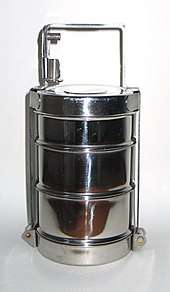
When literally translated, the word "dabbawala" means "one who carries a box". "Dabba" means a box (usually a cylindrical tin or aluminium container) from Persian: دَبّه, while "wala" is an agentive suffix, denoting a doer or holder of the preceding word.[5] The closest meaning of the dabbawala in English would be the "tiffin box delivery man".
Colour-coding system
Lunch boxes are marked in several ways:[6]
- Abbreviations for collection points
- Colour code for starting station
- Number for destination station
- Markings for handling dabbawala at destination, building and floor
A colour-coding system identifies the destination and recipient. Each dabbawala is required to contribute a minimum capital in kind, in the form of two bicycles, a wooden crate for the tiffins, white cotton kurta-pyjamas, and the white Gandhi cap (topi). Each month there is a division of the earnings of each unit. Fines are imposed for alcohol, tobacco, being out of uniform, and absenteeism.[7]
A collecting dabbawala, usually on bicycle, collects dabbas either from a worker's home or from the dabba makers. As many of the carriers are of limited literacy (the average literacy of Dabbawallahs is that of 8th grade[8]), the dabbas (boxes) have some sort of distinguishing mark on them, such as a colour or group of symbols.[9][10][11][12]
The dabbawala then takes them to a sorting place, where he and other collecting dabbawalas sort the lunch boxes into groups. The grouped boxes are put in the coaches of trains, with markings to identify the destination of the box (usually there is a designated car for the boxes). The markings include the railway station to unload the boxes and the destination building delivery address. Some modern infrastructure improvements such as the Navi Mumbai Metro are not used in the supply chain, as cabins do not have the capacity for hundreds of tiffins.[13]
At each station, boxes are handed over to a local dabbawala, who delivers them. The empty boxes are collected after lunch or the next day and sent back to the respective houses. The dabbawalas also allow for delivery requests through SMS.[14]
Hometowns and ethnic background
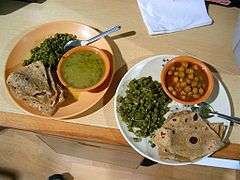
Most tiffin-wallahs are related to each other, belong to the Varkari[16] sect of Maharashtra,[17] and come from the same small village near Pune. Tiffin distribution is suspended for five days each March as the tiffin-wallahs go home for the annual village festival.[18][19][20][21][22]
Economic analysis
Each dabbawala, regardless of role, is paid around 8,000 rupees per month (about US$131 in 2014). Between 175,000 and 200,000 lunch boxes are moved each day by 4,500 to 5,000 dabbawalas. Tiffin-wallahs are self-employed. The union initiation fee is 30,000 rupees, which guarantees a 5,000-rupee monthly income and a job for life. The 150 rupee a month fee provides for delivery six days a week.(2002)[23][24][25]
It is frequently claimed[16] that dabbawalas make less than one mistake in every six million deliveries;[26] however, this is only an estimation from Ragunath Medge, the president of the Mumbai Tiffinmen's Association in 1998, and is not from a rigorous study. Medge told Subrata Chakravarty, the lead author of the "Fast Food" article by Forbes where this claim first appeared,[27] that dabbawalas make a mistake "almost never, maybe once every two months" and this statement was extrapolated by Subrata Chakravarty to be a rate of "one mistake in 8 million deliveries."[28] Chakravarty recalled the affair in an interview and said:
"Forbes never certified the dabbawalas as being a six-sigma organization. In fact, I never used the term at all. As you know, six-sigma is a process, not a statistic. But it is commonly associated with a statistic of 1.9 errors per billion operations, and that is what caused the confusion … . I was impressed by the efficiency and complexity of the process by which some 175,000 tiffin boxes were sorted, transported, delivered and returned each day by people who were mostly illiterate and unsophisticated. I asked the head of the organization how often they made a mistake. He said almost never, maybe once every two months. Any more than that would be unforgivable to customers. I did the math, which works out to one mistake in 8 million deliveries—or 16 million, since the tiffin carriers are returned home each day. That is the statistic I used. Apparently, at a conference in 2002, a reporter asked the president … whether the tiffinwallahs were a six-sigma organization. He said he didn't know what that was. When told about the 1.9 error-per-billion statistics, I'm told he said: "Then we are. Just ask Forbes". The reporter, obviously without having read my story, wrote that Forbes had certified the tiffinwallahs as a six-sigma organization. That phrase was picked up and repeated by other reporters in other stories and now seems to have become part of the folklore."
— Subrata Chakravarty, [28]
The New York Times reported in 2007 that the 125-year-old dabbawala industry continues to grow at a rate of 5–10% per year.[15]
In 2011, dabbawalas went on strike for the first time in 120 years to promote and attend a rally by Azad Maidan to support Anna Hazare in his campaign against corruption.[29]
Studies
Various studies have focused on dabbawalas:
- In 2001, Pawan G. Agrawal carried out his PhD research in "A Study & Logistics & Supply Chain Management of Dabbawala in Mumbai". He presented his results on the efficiency of Dabbawallas in various fora.[30]
- In 2005, the Indian Institute of Management (Ahmedabad) featured a case study on the Mumbai Dabbawallas from a management perspective of logistics.[31]
- In 2010, Harvard Business School added the case study The Dabbawala System: On-Time Delivery, Every Time to their compendium for its high level of service with a low-cost and simple operating system.[32]
- In 2014, Uma S. Krishnan completed her PhD research in "A Cross-Cultural Study of the Literacy Practices of The Dabbawalas: Towards a New Understanding of Non-mainstream Literacy and its Impact on Successful Business Practices."[33]
- Ritesh Shantaram Andre is the new and youngest Spokesperson of Mumbai Dabbawala.[34]
Guinness World Record
On 21 March 2011, Prakash Baly Bachche carried three dabbawalla tiffin crates on his head at one time, which was entered as a Guinness World Record.[35]
References
- "In Pictures: Tiffin time in Mumbai". BBC news. 16 February 2014. Retrieved 2 May 2014.
- "Bombay Dabbawalas go high-tech". Physorg.com. Retrieved 15 September 2011.
- Roncaglia, Sara (1 January 2013). "Feeding the city : work and food culture of the Mumbai dabbawalas". OpenBook Publishers. Retrieved 2 May 2017 – via Internet Archive.
- Nair, Supriya. "The Tiffin History of Mumbai - Livemint". www.livemint.com. Retrieved 8 April 2017.
- Pathak R.C. (1946, Reprint 2000). The Standard Dictionary of the Hindi Language, Varanasi: Bhargava Book Depot, pp.300,680
- Thakker, Pradip. "Mumbai's amazing dabbawalas". specials.rediff.com. Retrieved 8 April 2017.
- TEDx Talks (24 February 2011). "TEDxSSN - Dr. Pawan Agrawal - Mumbai Dabbawalas". Retrieved 3 May 2017 – via YouTube.
- Agrawal, Dr. Pawan. "Dabbawallahs - A talk by Dr. Pawan Agrawal". Ted X SSN Talks. You Tube. Retrieved 2 May 2014.
- magazine, Works That Work. "Dabbawallas: Delivering Excellence by Meena Kadri (Works That Work magazine)". worksthatwork.com. Retrieved 2 May 2017.
- PTI (13 July 2014). "NDMC launches new project to make unemployed women self-reliant". thehindubusinessline.com. Retrieved 2 May 2017.
- Bureau, Our (20 July 2012). "Taking the story of Mumbai's dabbawalas to IIM Calcutta". thehindubusinessline.com. Retrieved 2 May 2017.
- PTI (2 June 2013). "Mumbai dabbawalas to share success mantra in Dubai". thehindubusinessline.com. Retrieved 2 May 2017.
- Ramper, Johnny. "Dabbawalas: Preserving Tradition in Modern India". Z.E.N. Foods. Retrieved 8 April 2017.
- "BBC NEWS - Business - India's tiffinwalas fuel economy". news.bbc.co.uk. Retrieved 2 May 2017.
- In India, Grandma Cooks, They Deliver from The New York Times
- Indian Summer Festival Canada (23 July 2014). "Lunchbox Legends: The Dabbawalas of Mumbai". Retrieved 3 May 2017 – via YouTube. at Indian Summer Festival Vancouver
- Parmar, Beena (2 July 2014). "Mumbai's dabbawalas up delivery charges by ₹100". thehindubusinessline.com. Retrieved 2 May 2017.
- Bureau, Our (26 November 2013). "More lunch box ladies to deliver food cooked with love". thehindubusinessline.com. Retrieved 2 May 2017.
- Bureau, Our (2 April 2014). "Dabbawalas to deliver WHO's word". thehindubusinessline.com. Retrieved 2 May 2017.
- "nomadlife - an international nomads community". wayback.archive.org. Archived from the original on 16 December 2005. Retrieved 3 May 2017.CS1 maint: BOT: original-url status unknown (link)
- "DINODIA Photo Library - The largest collection of Indian photographs online". wayback.archive.org. Archived from the original on 9 August 2003. Retrieved 3 May 2017.CS1 maint: BOT: original-url status unknown (link)
- "BBC NEWS - South Asia - Tiffin time for Charles and Camilla". news.bbc.co.uk. Retrieved 3 May 2017.
- Harding, Luke (24 June 2002). "A Bombay lunchbox". Retrieved 2 May 2017 – via The Guardian.
- PTI (2 July 2014). "'Dabbawalas' hike delivery charges to meet rising inflation". thehindubusinessline.com. Retrieved 2 May 2017.
- "Upper Crust ::: India's food, wine and style magazine". wayback.archive.org. Archived from the original on 22 October 2002. Retrieved 3 May 2017.CS1 maint: BOT: original-url status unknown (link)
- The Guardian. A Bombay lunchbox (24 June 2002).
- Chakravarty, Subrata N. "Fast food." Forbes. 10 Aug. 1998. Forbes Magazine. 21 Sept. 2013 https://www.forbes.com/global/1998/0810/0109078a.html
- Pathak, Gauri Sanjeev. "Delivering the Nation: The Dabbawalas of Mumbai." South Asia: Journal of South Asian Studies 33.2 (2010): 235-257.
- Sheth, Priya; Ganguly, Nivedita (18 August 2011). "Dabbawalas to strike for the first time in 120 years". The Hindu Business Line. Retrieved 8 April 2017.
- "Dr. Pawan Agrawal". Kaizer. Archived from the original on 9 April 2014. Retrieved 2 May 2014.
- Ravichandran, N. (1 September 2005). World class logistics operations : The case of Bombay dabbawallahs (PDF). Ahmedabad: Indian Institute of Management. Archived from the original (PDF) on 24 September 2015. Retrieved 2 May 2014.
- Thomke, Stefan H.; Sinha, Mona (February 2010). The Dabbawala System: On-Time Delivery, Every Time (Case 610-059). Harvard, Ma.: Harvard Business School.
- S, Krishnan, Uma (1 January 2014). "A Cross Cultural Study of the Literacy Practices of the Dabbawalas: Towards a New Understanding of Nonmainstream Literacy and its Impact on Successful Business Practices". ohiolink.edu. Retrieved 2 May 2017.
- https://www.outlookindia.com/newsscroll/now-mumbai-dabbawalas-fight-fakes-in-fraternity/1637411
- "Most dabbawala tiffin crates carried on the head". Guinness World Records. Retrieved 2 May 2014.
Further reading
| Wikimedia Commons has media related to Dabbawalas. |
- Shekhar Gupta, Our computer is our head and our Gandhi cap is the cover to protect it from the sun or rain, Indian Express, Walk the Talk, NDTV 24x7.
- Hart, Jeremy (19 March 2006). "The Mumbai working lunch". The Independent Online. The Independent group, London. Archived from the original on 25 March 2007. Retrieved 20 March 2007.
- "Indian lunchbox carriers to attend the Royal nuptials". Evening Standard (London). Associated Newspapers Ltd. 5 April 2005. Retrieved 20 March 2007.
- Mumbai's Dabbawala: The Uncommon Story of the Common Man, Shobha Bondre. tr. Shalaka Walimbe. OMO Books, 2011. ISBN 81-910356-1-8.
- The Dabbawala System: On-Time Delivery, Every Time, by Stefan H. Thomke and Mona Sinha, Harvard Business School Case Study, February 2010 (Revised January 2013)
